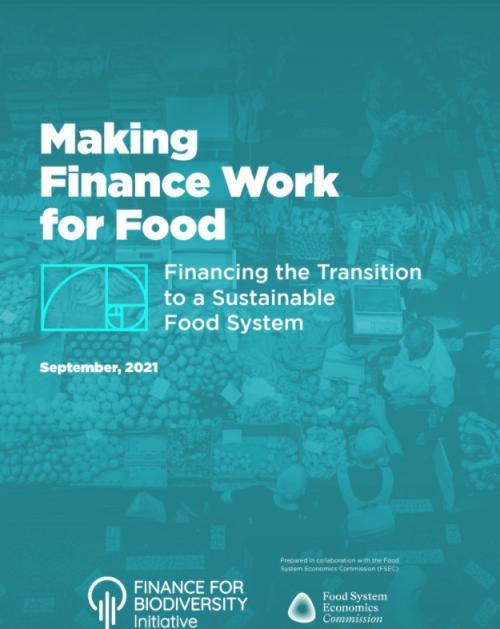
https://www.f4b-initiative.net/
F4B is a dual-purpose platform, both implementing its own activities across five work streams and making grants to support others to undertake work in these areas.
Global finance can and must be reshaped to ensure a rapid, fair and safe transition of the current unsustainable food system, reveals future-looking analysis from Finance for Biodiversity (F4B) today.
The report – Making Finance Work for Food: Financing the Transition to a Sustainable Food System, prepared in collaboration with the Food System Economics Commission (FSEC) ahead of the UN Food Systems Summit on 23 September – explores how food and finance can be better aligned to deliver an inclusive, healthy, and environmentally sustainable food system.
Today’s global food system – valued at US$8trillion a year and accounting for almost 10 percent of the global economy – is fundamentally unviable, contributing to poor nutritional outcomes, climate change, destruction of biodiversity, unstable food prices and security, and providing low quality, low paid jobs. The World Bank estimates these unpaid-for negative impacts are worth US$12 trillion – more than the food systems’ annual economic value.
A transition of the food system is therefore inevitable, but to what and how is hotly contested, exemplified by the strident and largely unproductive public disputes in the run up to the high-profile UN Food Systems Summit on 23 September 2021. Technology-driven solutions such as alternative protein and vertical farming are set against people and nature-friendly regenerative farming. There are also potential damaging short-term consequences of the inevitable transition, including bankruptcy, rural unemployment, and increases in food prices, poverty, and inequality that could occur during the shift to a more sustainable system.
The most contentious issue is the role of private finance, the focus of F4B’s report. Today’s food system is increasingly financialised, shaped by the logic of private finance. Private capital is essential to fund the transition, but undirected, it can reinforce negative food system outcomes. The report points to four levers that could help align global finance with the transition to an inclusive, healthy, sustainable food system:
The analysis is accompanied by a literature review on the interplay (‘nexus’) between food and finance, the most extensive analysis undertaken to date.
In its next phase of work on the food-finance nexus, F4B plans, with partners, to develop quantitative and case work that could lead to a more specific roadmap and recommendations for nudging the financial system into alignment with the transitional needs of the food system.
“Today, global finance is supporting a food system that destroys nature, contributes to climate change, and provides low paid jobs and poor nutritional outcomes. The global food system would be insolvent if we were in a world where polluters paid to clean up their own mess.
“Getting financialisation - the role of private finance - right is a pre-condition for transitioning to a sustainable, inclusive, healthy food system. Finance for Biodiversity points to how the global financial system can and must be reshaped to internalise nature and climate costs, and ultimately do its job by financing the next generation of food production systems that can deliver affordable nutrition for all.” Simon Zadek, Chair, F4B
"Current food systems are failing nature, climate, and people - but we can’t phase out food. We need to transform how we produce food and what we eat, to unleash the potential of food systems to support a nature-positive, net-zero emissions world. Financial institutions have a huge opportunity to be part of the solution. Harnessing blended finance and investing in nature-positive food production can help feed a growing global population and deliver on the fundamental human right to healthy and nutritious food produced within planetary boundaries."
Margaret L. Kuhlow, Global Finance Practice Leader, WWF
“Finance for Biodiversity spotlights the importance of intervening in the workings of global finance if we want to transition the food system and its outcomes, learning from and building on the last decade’s experience in accelerating the clean energy transition”
Rachel Kyte, Dean of The Fletcher School, Tufts University
Click on the links below to read the two F4B food-finance papers in full:
Making Finance Work for Food: Financing the Transition to a Sustainable Food System
This report describes the current state of the nexus between the global food and financial systems and explores how the two can be better aligned to deliver an inclusive, healthy, and environmentally sustainable food system. It maps out how global finance can be shaped to support the needed transition.
Food-Finance Nexus Literature Review
Based on over 400 institutional and academic publications, this literature review outlines the major ongoing debates on the Food-Finance Nexus and centralizes references to the most relevant publications. It is one of the most extensive reviews of the food-finance literature undertaken to date.














Add new comment